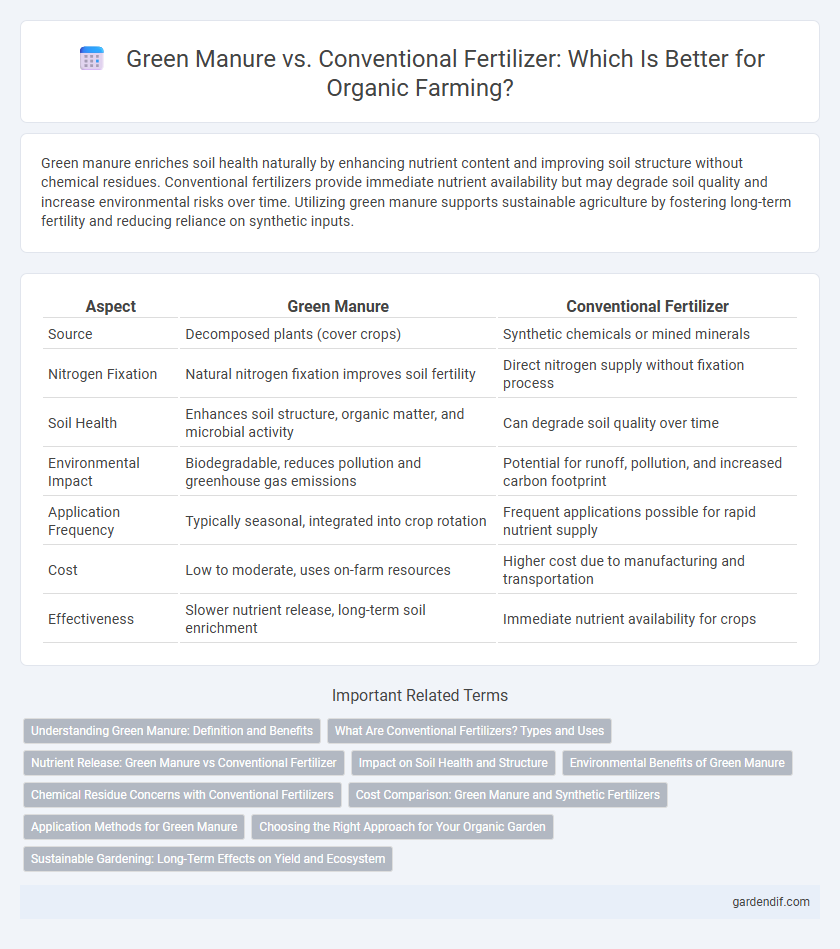
Green manure vs Conventional fertilizer Illustration
Green manure enriches soil health naturally by enhancing nutrient content and improving soil structure without chemical residues. Conventional fertilizers provide immediate nutrient availability but may degrade soil quality and increase environmental risks over time. Utilizing green manure supports sustainable agriculture by fostering long-term fertility and reducing reliance on synthetic inputs.
Table of Comparison
| Aspect | Green Manure | Conventional Fertilizer |
|---|---|---|
| Source | Decomposed plants (cover crops) | Synthetic chemicals or mined minerals |
| Nitrogen Fixation | Natural nitrogen fixation improves soil fertility | Direct nitrogen supply without fixation process |
| Soil Health | Enhances soil structure, organic matter, and microbial activity | Can degrade soil quality over time |
| Environmental Impact | Biodegradable, reduces pollution and greenhouse gas emissions | Potential for runoff, pollution, and increased carbon footprint |
| Application Frequency | Typically seasonal, integrated into crop rotation | Frequent applications possible for rapid nutrient supply |
| Cost | Low to moderate, uses on-farm resources | Higher cost due to manufacturing and transportation |
| Effectiveness | Slower nutrient release, long-term soil enrichment | Immediate nutrient availability for crops |
Understanding Green Manure: Definition and Benefits
Green manure refers to specific plants cultivated primarily to enhance soil fertility by being plowed back into the earth, enriching it with organic matter and nutrients. This method improves soil structure, increases microbial activity, and enhances water retention, promoting sustainable agriculture. Unlike conventional fertilizers that supply immediate nutrients, green manure fosters long-term soil health and reduces chemical dependency.
What Are Conventional Fertilizers? Types and Uses
Conventional fertilizers are chemical or synthetic substances formulated to supply essential nutrients like nitrogen, phosphorus, and potassium directly to plants, promoting rapid growth and high crop yields. Common types include nitrogen-based fertilizers such as ammonium nitrate, phosphate fertilizers like superphosphate, and potash fertilizers, each targeting specific nutrient deficiencies in soil. These fertilizers are widely used in conventional agriculture to enhance soil fertility quickly and support intensive farming practices.
Nutrient Release: Green Manure vs Conventional Fertilizer
Green manure releases nutrients gradually as plant material decomposes, enriching soil organic matter and improving long-term fertility. Conventional fertilizers provide immediate nutrient availability, primarily nitrogen, phosphorus, and potassium, tailored for rapid plant uptake but may risk leaching. The nutrient release from green manure supports sustainable soil health, while conventional fertilizers focus on quick nutrient supply for short-term crop demands.
Impact on Soil Health and Structure
Green manure enhances soil health by increasing organic matter, improving microbial activity, and promoting nutrient cycling, which leads to better soil structure and increased water retention. Conventional fertilizers provide essential nutrients quickly but often lack organic components, potentially causing soil degradation and reduced microbial diversity over time. Long-term reliance on green manure supports sustainable soil fertility, while conventional fertilizers may require supplementary practices to maintain soil structure and health.
Environmental Benefits of Green Manure
Green manure enhances soil fertility naturally by fixing atmospheric nitrogen and increasing organic matter, reducing the need for synthetic fertilizers that can cause pollution. It improves soil structure and water retention, leading to decreased erosion and runoff, thus protecting local waterways from contamination. Using green manure supports biodiversity by promoting healthier soil ecosystems and reducing chemical residue in the environment.
Chemical Residue Concerns with Conventional Fertilizers
Conventional fertilizers often contain synthetic chemicals that can leave harmful residues in soil and water, raising environmental and health concerns. Green manure, derived from organic plant materials, naturally enriches soil fertility without introducing toxic substances, reducing the risk of chemical buildup. Choosing green manure supports sustainable agriculture by enhancing soil health and minimizing contamination from chemical residues.
Cost Comparison: Green Manure and Synthetic Fertilizers
Green manure offers a cost-effective alternative to synthetic fertilizers by utilizing locally available plant biomass, reducing the need for purchased chemical inputs. While synthetic fertilizers provide immediate nutrient availability, their recurring purchase and potential environmental remediation costs often surpass the minimal expenses associated with green manure production. Long-term use of green manure enhances soil fertility and structure, potentially lowering overall farm input costs compared to conventional fertilizer reliance.
Application Methods for Green Manure
Green manure is applied by integrating cover crops, such as clover or rye, directly into the soil before planting cash crops, enhancing soil fertility and structure naturally. Unlike conventional fertilizers, which are often spread on the soil surface or injected in liquid form, green manures require plowing or tilling to incorporate the organic matter, promoting nutrient cycling and microbial activity. This method of application improves soil organic content and moisture retention, leading to sustainable crop production with reduced chemical inputs.
Choosing the Right Approach for Your Organic Garden
Green manure enriches soil naturally by adding organic matter and improving microbial activity, promoting sustainable nutrient cycling in your organic garden. Conventional fertilizers provide immediate nutrient boosts but may disrupt soil health and reduce long-term fertility. Opting for green manure supports continuous soil vitality and aligns with organic gardening principles, ensuring healthier plants and ecosystems.
Sustainable Gardening: Long-Term Effects on Yield and Ecosystem
Green manure enhances soil fertility by increasing organic matter and microbial activity, promoting sustainable gardening through improved nutrient cycling and soil structure. Conventional fertilizers provide immediate nutrient availability but may lead to soil degradation and reduced biodiversity over time. Sustainable gardening benefits from green manure's ability to maintain long-term soil health, resulting in stable crop yields and a balanced ecosystem.
Green manure vs Conventional fertilizer Infographic

 gardendif.com
gardendif.com